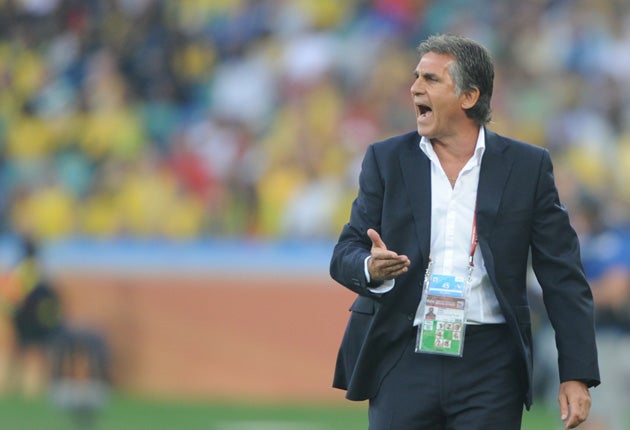Chris McGrath: Portugal's coach is chasing a personal dream
World Cup Lives

The film reels would only arrive three or four weeks after the match, as though already infused with the nostalgic flavours since saturating the memory of Carlos Queiroz. He sat rapt in the clubhouse at Ferroviario as another son of Mozambique, Eusebio, scored nine goals in Portugal's first ever World Cup. It was 1966, and Queiroz was 13 years old.
He remembers watching Eusebio orchestrating a famous defeat of Brazil a dozen times over. Nowadays the black-and-white footage offers a ghostly evocation of a time when both Brazil and Mozambique shared fealty to Portugal, but of course that is what World Cups do. They embroider a fresh ethnic map of expansion, rebellion and reconciliation. For Queiroz, certainly, Portugal's showdown with Spain tonight is rather more than a jealous Iberian squabble on neutral turf. With the obvious exception of Ghana, perhaps none of the tournament's surviving protagonists would cherish a World Cup on African soil more than the Portugal manager.
Ferroviario, in Nampula, was one of many clubs in Mozambique founded by and for railway workers – men like Queiroz's own father. Carlos followed him into the team, as goalkeeper. He wanted to be the next Alberto da Costa Pereira, who had left railway football there for a glorious career with Benfica and Portugal.
By the time he was 20, however, Queiroz would find himself in Portugal not as a footballer, but as a refugee. In the 1970s, Mozambique endured one of Africa's many traumatic journeys to independence, via years of colonial and internecine violence. Even so, Queiroz arrived in Lisbon with a more benign legacy. Raised at the confluence of many different cultures, he speaks five languages and is able to treat even the most momentous of football matches with due dispassion. Here, after all, is a man who assisted a campaign to persuade Mozambique's displaced rural population back from the slums to the land – by organising football matches on cleared minefields.
Our familiarity with Cristiano Ronaldo and Jose Mourinho guarantees that Portugal's football culture will tonight offer its neighbours not just creativity and theatre, but also fire and ire. Queiroz, however, has built his career in cerebral, reflective counterpoint to the Latin furies. "We are all human beings, all have emotions," he said once. "But success is about intelligence."
When he first arrived at Manchester United in 2002, he was profiled in the press as dapper, charming, even as a footballing Julio Iglesias. But he was also mistrusted. "Carlos Query", they called him. After studying at the same sports university as Mourinho, he had developed his coaching career in tandem with the adolescent geniuses of Luis Figo, Rui Costa and Joao Pinto. Together they won the world youth championships in 1989 and 1991, after which he graduated with his charges as manager of the senior team. But he left in 1994, having failed to qualify for the World Cup, and spent a couple of seasons at Sporting Lisbon – replacing Bobby Robson, who disparaged him as a PE teacher.
There followed an odyssey that included work in the US, Japan, the UAE; and then a return to his roots, qualifying South Africa for the 2002 World Cup. That assignment came to an acrimonious end before the finals, however, prompting Sir Alex Ferguson into what he ranks as one of his best decisions. Admittedly, there would be a notorious hiatus after just one season as assistant at Old Trafford, when Queiroz was seduced through Real Madrid's revolving door. Oddly, the man he replaced on Florentino Perez's Bernabeu barbecue was Vicente del Bosque, who will tonight be seated on the Spanish bench. "It was a bad time to be at the club," Queiroz remembered. "A time when the president started to believe he knew about football. In his mind, releasing [Claude] Makelele vacated a position in which [David] Beckham could play."
It lasted one, unhappy season, but Ferguson welcomed him back. Queiroz, after all, had found him not just a replacement for his most celebrated player, but one who would eventually cause Perez to pay United more than three times as much as he did for Beckham. It is well documented that United depended on Queiroz's judgement in choosing Ronaldo above Ricardo Quaresma.
But what finally restored his professional dignity was the summons, in 2008, back to national service. He began horribly, but Portugal scraped through the play-offs, negotiated the "Group of Death" with a 7-0 annihilation of North Korea, and seem to have developed some momentum.
There had been a time when Queiroz tormented himself over the failed vision of 1994, with Figo's golden generation. "It is difficult for me to cope with the ugly feeling I have, deep in my soul, that there was some unfinished business," he said once. "That I missed an opportunity that will never, ever happen again."
Instead, as things have turned out, he has a second chance. And it is all the sweeter that he should find it in Africa, his home from home.
Join our commenting forum
Join thought-provoking conversations, follow other Independent readers and see their replies
Comments
Bookmark popover
Removed from bookmarks